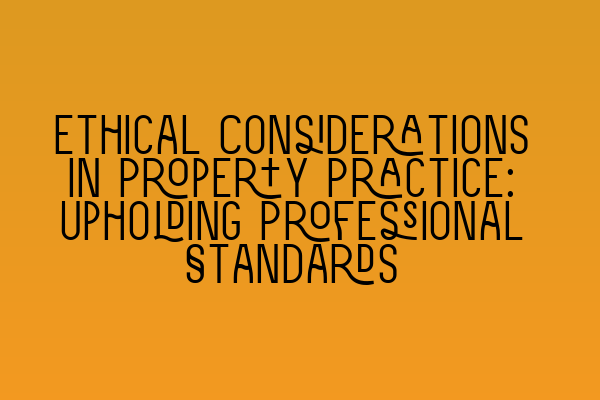Ethical Considerations in Property Practice: Upholding Professional Standards
Introduction:
In the realm of property practice, upholding professional standards and maintaining ethical considerations are of utmost importance. As solicitors, writers, and SEO experts at SQE Property Law & Land Law, we understand the significance of ethical conduct and its impact on the working relationships with clients, colleagues, and the community at large. This blog post aims to delve deeper into the ethical considerations that property practitioners must adhere to in order to uphold professional standards.
1. Confidentiality:
Confidentiality forms the bedrock of trust in client relationships within property practice. As solicitors, we are privy to sensitive information and are entrusted to maintain the confidentiality of our clients. Upholding this ethical obligation ensures that clients feel secure in sharing their personal and financial details. It is crucial to prioritize the protection of confidential information by implementing secure document storage and robust data protection protocols.
Keywords: confidentiality, client relationships, trust, sensitive information, personal details, financial details, document storage, data protection.
2. Conflict of Interest:
Property practitioners frequently navigate complex situations where conflicts of interest may arise. It is our duty to identify and manage such conflicts in a transparent and ethical manner. In cases where conflicts are unavoidable, we must be proactive in disclosing them to clients and obtaining their informed consent. Failing to address conflicts of interest compromises our professional integrity and erodes client trust.
Keywords: conflict of interest, ethical manner, transparent, proactive, professional integrity, client trust.
3. Honesty and Transparency:
Honesty and transparency are fundamental principles that underpin property practice. When advising clients, it is crucial to provide accurate, reliable, and unbiased information. Misleading clients, engaging in deceptive practices, or withholding crucial information violates ethical standards. Property practitioners must exercise diligence in their research, presentations, and communications while ensuring that clients are fully informed, enabling them to make well-informed decisions.
Keywords: honesty, transparency, accurate information, reliable information, unbiased information, misleading, deceptive practices, withholding information, diligence, well-informed decisions.
4. Professional Competence and Development:
Property law is a dynamic field that constantly evolves. Upholding professional standards requires property practitioners to stay up-to-date with the latest legal developments and demonstrate competence in their field. By engaging in regular professional development activities, attending relevant seminars, and undertaking continuous learning, property practitioners can ensure that their advice and service provision are of the highest quality. This commitment to ongoing improvement assists in maintaining the trust and confidence of clients.
Keywords: professional competence, professional development, legal developments, competence, regular professional development, seminars, continuous learning, highest quality, trust and confidence.
5. Client Fiduciary Duty:
As property practitioners, we owe a fiduciary duty to our clients. This means that we must act in their best interests and avoid any conflicts that may compromise our ability to do so. This duty extends to loyalty, honesty, and ensuring that clients’ interests are not subverted by our own personal or financial gain. Upholding this fiduciary duty builds trust and fosters strong client relationships based on the values of integrity and professionalism.
Keywords: client fiduciary duty, best interests, conflicts, loyalty, honesty, personal gain, financial gain, trust, client relationships, integrity, professionalism.
Conclusion:
Upholding ethical considerations in property practice is not only a professional obligation but also a crucial aspect of delivering exceptional service to clients. By prioritizing confidentiality, managing conflicts of interest, practicing honesty and transparency, maintaining professional competence, and adhering to client fiduciary duty, property practitioners can navigate their roles with integrity and contribute positively to the profession. As solicitors, writers, and SEO experts at SQE Property Law & Land Law, we are committed to upholding these ethical considerations and maintaining the highest professional standards in our work.
Keywords: professional obligation, exceptional service, confidentiality, conflicts of interest, honesty, transparency, professional competence, client fiduciary duty, integrity, profession.
